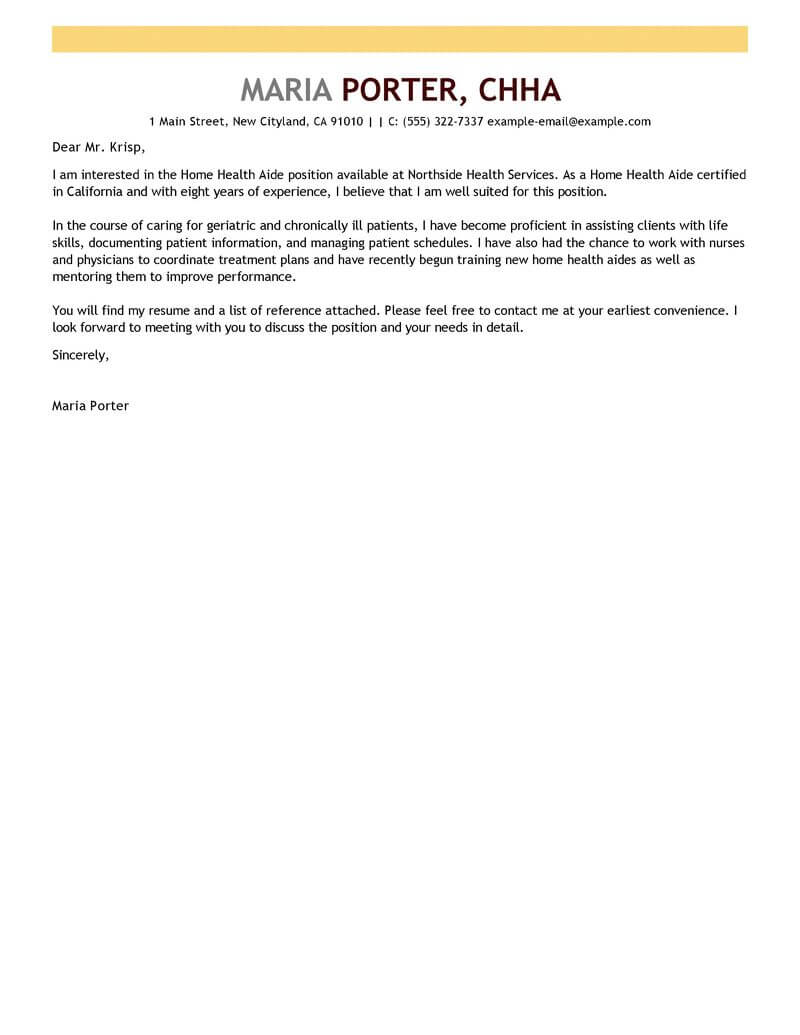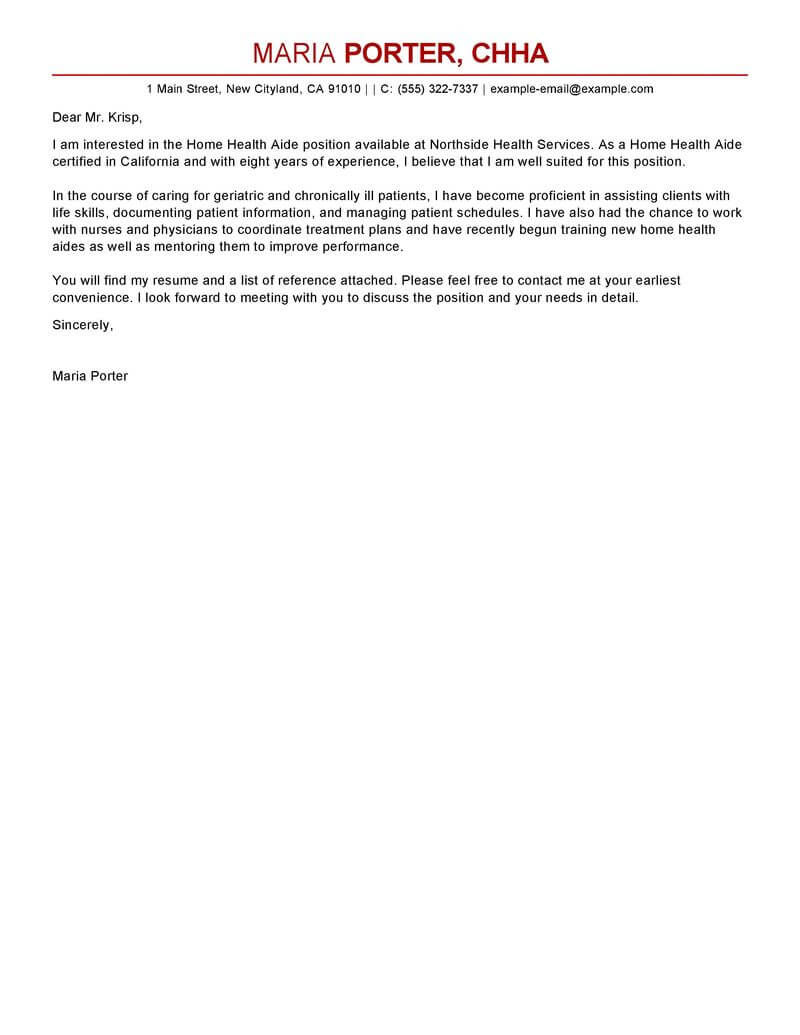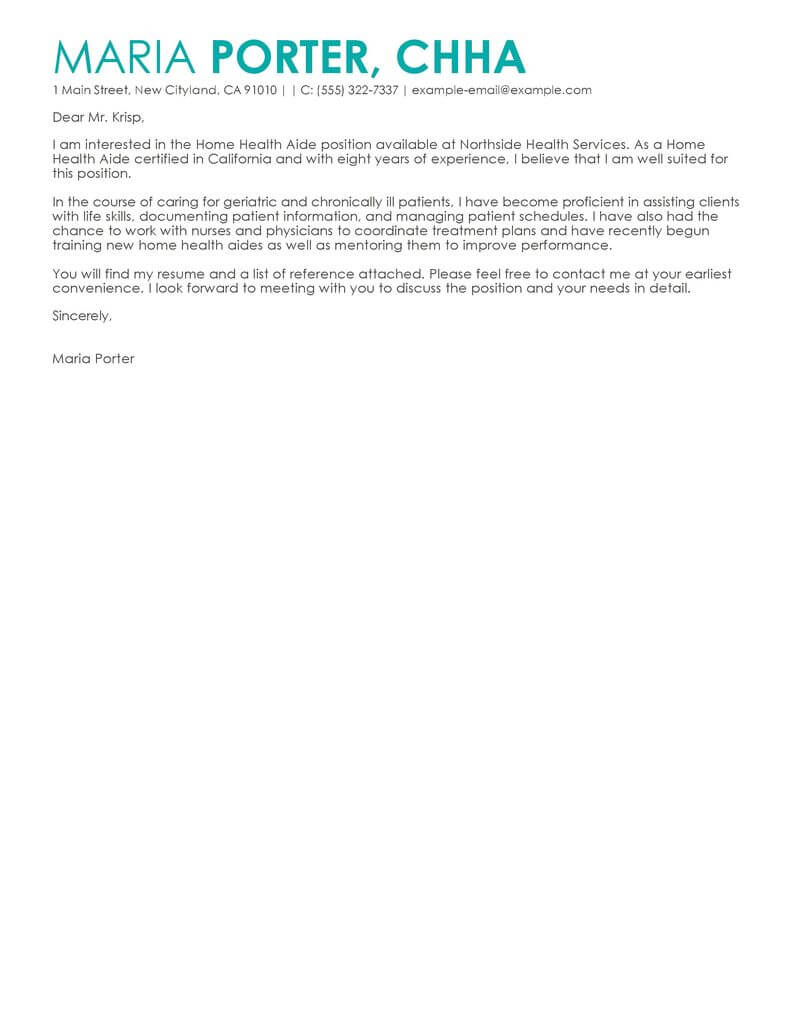Best Home Health Aide Cover Letter Examples
Published: Friday 4th of August 2017; Words Count: 1300
It can be difficult to convey a warm personality or compassionate heart on paper. That is why writing a cover letter is an excellent way to show those character qualities to potential employers in the health care field. Take a look at our home health care aide cover letter example and the tips provided to help you create an inspiring cover letter of your own.
- Do use positive quotes or comments from previous employers when applicable. It can be encouraging to a hiring manager to know that prior bosses or peers considered you worth recommending.
- Don’t feel restricted to template. You can use some creativity when formatting your cover letter to make it more memorable as long as it still looks and sounds professional.
- Do use a more casual tone for your cover letter. Using overly formal language can sound fake, boring and unapproachable which is not a positive thing in the health care industry.
- Don’t use cliché terms like Âteam player” or Âgreat with people” to describe yourself. Choosing more descriptive phrases such as ÂI’m an outstanding medical professional who enjoys working alongside others to provide the best possible care for patients” can be more convincing.
Home Health Aide Advice
A home health aide takes care of elderly or disabled patients in their homes, and assists with everyday tasks and household chores. The home health aide cover letter examples below have been designed to help you create a job-winning cover letter. Just click on any of the cover letter examples below, and use the text samples as a guide to building your own letter. Then, customize to build a job-winning cover letter in minutes!

Cover Letter Tips for Home Health Aide
Make your pursuit of jobs as a Home Health Aide go smoother by following these pieces of advice for a productive and targeted search.
1. Assess your professional qualifications, as well as your personal characteristics and life circumstances, to figure out what type of position is a good fit for your values and goals. This will save you time and effort expended on pursuing positions that are not right for you.
2. Many employers will ask you for professional references. Select several professional contacts and ask them for their permission to be listed as references. Try to give them an accurate understanding of what this will entail  some will be willing to speak on the phone but are not able to put in the time to fill out and mail forms.
3. If you are not currently employed, look for other ways to stay involved in your field. Run an industry news site or discussion board, contribute to trade publications or volunteer your professional skills to serve your community. These activities will demonstrate your commitment and ensure that you stay current and present within your industry.
4. Be active within your local professional organization, whether through organizing, volunteering or providing education. This great way to network will help you connect with other in your field and to learn about professional opportunities.
5. Be persistent. Job searches are often lengthy and frustrating processes. Knowing that it takes determination and patients to succeed will help you overcome discouragement.

Home Health Aide Job Seeking Tips
An excellent cover letter will attract positive attention from potential employers and lead to interviews. Create a cover letter that will advance your search for jobs as a Home Health Aide by reviewing these tips for improvement.
1. Check your cover letter for typos and grammatical errors that may not be caught by your spellchecking and grammar-checking programs. Even small mistakes can detract from your cover letter and give an impression of carelessness.
2. Use consistent spacing, fonts, punctuation and capitalization to present an organized and neat appearance.
3. Your cover letter is not the place for explaining employment gaps or other problematic issues in your work or education history. Be guided by common sense and industry convention when deciding which issues should be mentioned in a cover letter, what can be discussed during the interview, and what information is not relevant to your job application and should be omitted altogether.
4. If your last job search took place many years ago, take some time to update yourself on current rules and standards for cover letters in your field.
5. If your history includes particularly outstanding professional achievements, list them in a separate section to make sure that they get noticed.






